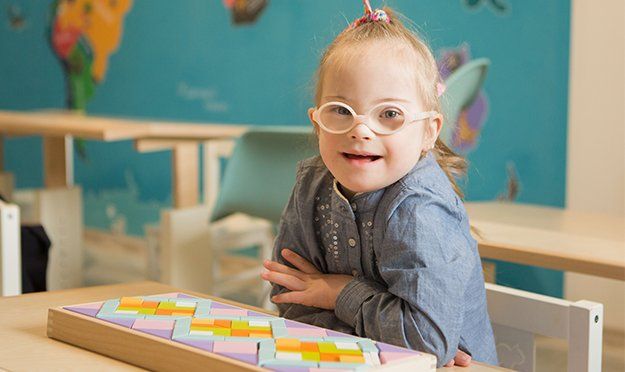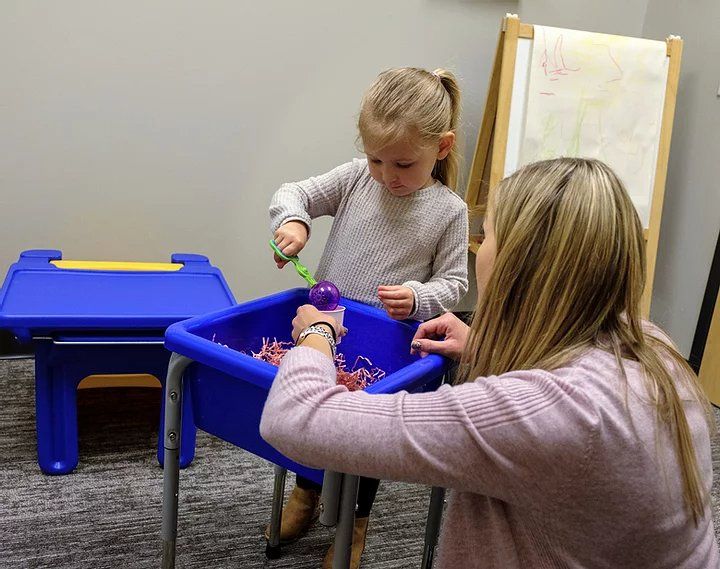Occupational Therapy
Occupational Therapy Services
We provide pediatric occupational therapy in Moorhead, MN and surrounding areas. These services are geared towards helping children gain independence while strengthening the development of visual motor skills, fine and gross motor skills, and sensory motor skills that children need to be able to function and socialize with others.
Individualized Child Center Services
Here at Interact Therapy, we provide individualized child center services to children with various needs. We aim to work with each child to help them overcome developmental delays, achieve independence, and to meet their full potential. Our comprehensive structure is one of the reasons we're a preferred choice for pediatric occupational therapy in Moorhead, MN and surrounding areas.
Each child is unique, so we work to create treatment techniques and therapeutic programs that are specifically designed to meet the needs of each child. We also work with parents, caregivers, teachers, and healthcare practitioners to help a child function fully no matter where they are at.
Making an Appointment
Contact Interact Therapy via
our
contact form, by emailing us at info@interact-therapy.com, or by calling
(701) 532-1906.
Physician referrals may be faxed to (701) 532-1896.
Wondering if your child needs an Occupational Therapy evaluation? Some common referral criteria include: birth injuries or birth defects, autism/pervasive developmental disorders, learning problems, sensory processing disorders, mental health or behavioral problems, traumatic injuries (brain or spinal cord), developmental delays, spina bifida, traumatic amputations, broken bones or other orthopedic injuries, and more.
By 3 Months
Social/Emotional
Begins to develop a smile and imitates some movements and facial expressions.
Gross Motor
Raises head and chest when on tummy, supports upper body with arms when on tummy, and pushes into surface when their feet are placed on a firm surface.
Fine Motor
Opens and closes hands, brings their hand to mouth, and grasps things.
By 7 Months
Social/Emotional
Enjoys social interaction and is happy often.
Gross Motor
Rolls front to back and back to front, can get into sitting without assistance, and crawls forward on belly.
Fine Motor
Reaches with one hand, transfers object from hand to hand, uses raking of the hand to grasp objects, finger-feeds self.
Cognitive
Finds partially hidden objects and explores objects with hands and mouth.
Language
Likes to babble.
By 12 Months
Social/Emotional
Is shy with strangers, shows preference for certain people and toys, tests parent responses to behaviors, and finger-feeds self.
Gross Motor
Crawls on hands and knees, pulls to stand, walks holding onto furniture, and takes two or three steps without support.
Fine Motor
Uses pincer grasp, bangs two objects together, puts objects into container, and releases objects voluntarily.
Cognitive
Explores objects in many ways (shaking, banging, throwing, dropping), finds hidden objects easily, and begins to use objects correctly (brushing hair, drinking from cup).
Language
Responds to simple one-step verbal command with gestures, and understands “no.”
By 18 Months
Social/Emotional
Separation anxiety increases and begins to show defiant behavior.
Gross Motor
Walks alone and pulls toys while walking.
Fine Motor
Turns over container to pour out contents, spoons feeds, and uses open cup and sippy cup.
Cognitive
Imitates housework.
Language
Responds to one step command without gesture, points to body parts, points to object or picture when named for them, and says several single words.
By 2 Years
Social/Emotional
Imitates behaviors of others particularly adults and older children, increasingly excited about company of other children, and their separation anxiety begins to fade.
Gross Motor
Carries large toy or several toys while walking, begins to run, can kick a ball, and walks up and down stairs with support.
Fine Motor
Scribbles, builds tower of 4 or more blocks, and demonstrates handedness.
Cognitive
Helps with undressing, can find objects hidden under multiple covers, begins to sort by shapes and colors, begins to engage in parallel play, begins make believe play.
Language
Follows a two-step command and uses simple phrases.
By 3 Years
Social/Emotional
Imitates adults and playmates, shows affection for others, can take turns in games, expresses a wide range of emotions, and separates easily from parents.
Gross Motor
Climbs well, walks up and down stairs alternating feet, runs easily, pedals a tricycle, and can bend over without falling.
Fine Motor
Makes lines vertically, horizontally, and scribbles circles, turns pages of a book one at a time, builds a 6 block tower, holds a crayon or pencil in writing position.
Cognitive
Makes mechanical toys work, plays make-believe with dolls and animals, participates in cooperative play, completes inset puzzles with 3-4 pieces, undresses self, and toilet training begins.
Language
Understands most sentences and understands placement in space (in, on, under).
By 4 Years
Social/Emotional
Interested in new experiences, plays “mom” or “dad”, and dresses and undresses.
Gross Motor
Hops and stands on one foot, goes up and down stairs without support, throws a ball overhead and can catch a bounced ball most of the time.
Fine Motor
Copies squares, draws a person with 2-4 body parts, uses scissors, draws circles and squares, and begins to copy capital letters.
Cognitive
Correctly names colors, understands concept of counting, begins to understand time, and understands the concept of “same” and “different.”
Language
Has mastered some basic rules of grammar and speaks clearly enough for others to understand them.
By 5 Years
Social/Emotional
Wants to please friends, more likely to agree to rules, likes to sing, dance and act, aware of gender, and able to distinguish fantasy from reality.
Gross Motor
Stands on one foot for 10 seconds or longer, can hops, somersault, swing, and is beginning to skip.
Fine Motor
Copies triangle and other shapes, draws a person with a body, prints uppercase letters, cuts on line consistently, uses a fork and spoon, and cares for own toileting needs.
Cognitive
Can count 10 or more objects and knows about use of everyday items (food, money).
Language
Recalls part of a story, and can use future tense.
By 6 Years
Social/Emotional
Needs to win and may change rules to suit, increasingly aware that others have feelings, shows more interest in taking care of his or her self without help, cleans his or her room, including making the bed, and likes board games, crafts and other constructive projects.
Gross Motor
Can move in time with music or a beat, very interested in climbing and balancing, takes risks, learns to skip with rope, more in control of his or her body, can bounce and catch a tennis ball.
Fine Motor
Holds a pencil with three fingers with movement from fingers, copies a diamond, draws a person with detail, writes the alphabet, ties shoelaces without help, eye-hand coordination significantly improves, masters buttons and fasteners, and can cut with a knife.
Cognitive
Develops reasoning skills, learn through language and logic/reasoning, and shows a strong desire to learn.
Language
Developing reading skills well.
By 7 Years
Social/Emotional
Desires to be perfect and is quite self-critical, tends to complain and has strong emotional reactions, understands the difference between right and wrong, and can take direction well.
Gross Motor
Has good balance, executes more complicated gymnastics such as a cartwheel, and activities become more sport specific.
Fine Motor
Proficient with paper and pencil tasks and is able to organize multi-step sequences.
Cognitive
Able to solve more complex problems, individual learning style becomes more clear-cut, and can solve simple math problems using objects.
Language
Uses a vocabulary of several thousand words.
Comprehensive Occupational Therapy Evaluations Will Look at the Following:
- Gross motor skills
- Fine motor skills
- Visual motor skills
- Visual perceptual
- Handwriting
- Daily living
- Sensory processing skills
The use of standardized assessment tools, non-standardized assessment tools, parent interviews, and clinical observations will be used to assess each child's performance. If you're looking for pediatric occupational therapy in Moorhead, MN or surrounding areas, then contact us today to get started.



Share On: